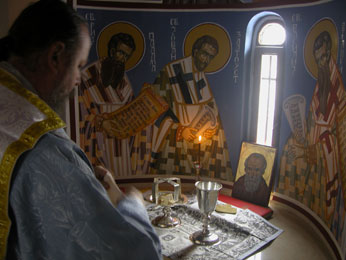Star Dojran, Divine Liturgy ( 15.12.2007 )
Today, Metropolitan of Strumica Nahum celebrated Divine Liturgy in the monastery of Saint Maximus the Confessor and Saint Gregory Palamas in Star Dojran.
Then He noted how they chose the best places, saying to them: “When you are invited by anyone to a wedding feast, do not sit down in the best place, lest one more honorable than you be invited by him; and he who invited you and him come and say to you, ‘Give place to this man,’ and then you begin with shame to take the lowest place.
But when you are invited, go and sit down in the lowest place, so that when he who invited you comes he may say to you, ‘Friend, go up higher.’ Then you will have glory in the presence of those who sit at the table with you. For whoever exalts himself will be humbled, and he who humbles himself will be exalted. (Luke 14:7-11)
In the sermon about today’s Gospel, the Bishop stated:
When a wedding feast in which a change of places is concerned, then this Gospel reading does not pertain to the eschatological
In addition, the lowest place, taken by the one after he has been put to shame signifies one thing, while the lowest place taken by the invitee himself at the wedding feast, in accordance with the Lord’s command, signifies another thing. Today, I will speak about the latter…
As indicated by the Lord’s words: Whoever for the sake of human glory exalts himself, meaning that, whoever looking for attention, honors and subservience from people and considers himself very important, will be humbled. And the one, who humbles himself for the sake of God, asking for the lowest place through the struggle of self-condemnation, even accepting to be cast away by everyone, will be exalted by God. Remember all the martyrs, the fools-for-Christ, and the true monks…
The lowest place, at the stage of purification of the heart from the passions, means dying for the world, estranging, absolute obedience and within the framework of that obedience—being obedient and a servant to everyone. If there is anyone to whom we are not obedient, that means that we have not taken the lowest place. We have not fulfilled God’s commandment: go and sit down in the lowest place! At the beginning this struggle is mainly ascetical, meaning that we mainly force ourselves to do it, until our heart, drenched with sweat, starts pouring out, and then the struggle becomes mainly that of grace—we desire the lowest place ourselves and we strive to achieve it.
The lowest place, at the level of illumination of the mind, means spending long hours in a prayerful containment of the mind in the heart and mainly ascetical love towards the enemies. You can imagine how first places and human glory seem of little importance to the one, who, after having spent several hours in prayerful containment of his mind in his heart, needs some time, once he is out of that state, to become aware of who he is, where he is, or what time it is…
Why are we talking about ascetical love at this level? When love towards the enemies is concerned, one should know that what comes as graceful and ‘natural’ at the third stage, is still an ascetical struggle at the second stage. Love towards the enemies is the only criterion of the divinity of our love towards our neighbors. Everything else that we call love is only at the level of the soul or a temporary visit of grace.
Consider each day as lost, if you did not cry in it, says somewhere St. John Climacus, while I say to you, explaining further, also consider as lost the day in which you were not hurt, humbled, or put at the lowest place, that is, if your pride was not stomped on. Because this is what the first beatitude consists of (blessed are the poor in spirit), while crying belongs to the second beatitude. Without humility and settling in the lowest place, we remain without foundation for our subsequent spiritual life.
Let us not wait, however, for that to happen, i.e. to humble ourselves through the endurance of involuntary sufferings, so that the others would put us in the lowest place, because the purification through such passive struggle takes longer. Humble yourselves (with an active struggle of your own volition), put yourselves to the lowest place! Be as the One Who says: I did not come to be served, but to serve.
The lesson is: We should as soon as possible liberate ourselves from the high opinion of ourselves and from pride. And we see that we are bonded by this passion of the mind, when someone harms us (deliberately or not), and our heart immediately reacts. At once demonic darkness befalls us, at once a swarm of thoughts distract our mind, at once evil feelings overwhelm our soul. Thus we see that our mind and heart are still held captive by pride. If we do not liberate from this passion with an ascetical (voluntary) struggle and through involuntary sufferings, there is no opening of the heart, no mind-and-heart prayer. That also means a failure of the monastic life, for instance…
All in all, it is rather interesting to note that we oppose and recoil against the thing that is of the greatest spiritual advantage to us—stomping on our pride. We go against the one who harmed our vainglory, instead of considering him our greatest benefactor. It is as if we temporarily forget that there are demons, too, and that our struggle is not against flesh and blood…
Lord Jesus Christ, have mercy on us!”
(as recorded by the Sisters)



